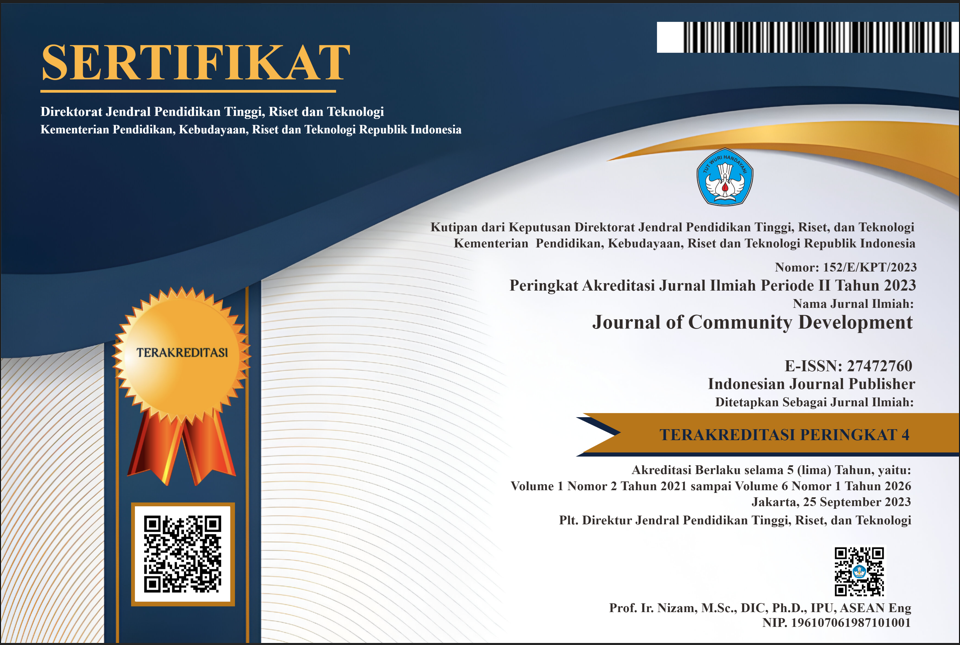Pendampingan Mahasiswa Sebagai Agents of Change: Mendorong Penerapan Teknologi Informasi Yang Beretika dan Berlandaskan Nilai-Nilai Islam
DOI:
https://doi.org/10.47134/comdev.v5i2.1371Keywords:
Agents of Change, Implementation of Information Technology, Values of IslamAbstract
The development of digital literacy is very important in facing the current digital era. In the educational context, digital literacy is the foundation that enables the learning process to be more interactive, dynamic and in line with current developments. This shows that digital literacy is not only relevant in everyday life, but also has a significant impact in the world of education, especially at the tertiary level. Students' digital literacy skills are an important aspect in facing the demands of today's digital era. However, just having information and communication technology skills is not enough, students are also required to understand, use and utilize digital technology effectively, responsibly and ethically with character and based on Islamic values. The form of service activity is a seminar which is held online via the zoom meeting application with the presentation method. To assess the achievement of goals and success of this service activity, the following indicators can be used as benchmarks, namely indicators of goal achievement and success benchmarks. By combining the two indicators above, it can provide a comprehensive picture of the achievement of objectives and the success of Community Service activities that have been carried out. Based on the evaluation results obtained from the reporting stage, it is known that this activity has various advantages and does not experience difficulties during its implementation, as well as assisting students as agents of change in the application of information technology can be carried out more ethically and based on Islamic values.
Downloads
References
Afriyanti, L. & Junaidi, K., 2022, ‘Pendampingan Pengenalan Literasi Digital untuk Pengembangan Santripreneur Sebagai Penggerak Ekonomi Kreatif di Pondok Pesantren’, 1(1), 495–500.
Arizal, O., 1, B., Rahmat, H.K., Said, A., Basri, H., Dadang, D., Rajab, A. & Nurjannah, N., 2021, ‘Urgensi Literasi Digital dalam Menangkal Radikalisme pada Generasi Millenial di Era Revolusi Industri 4.0’, Dinamika Sosial Budaya, 23(1), 126–133.
Asikin, H., Uyelindo, S. & Kupang, I., 2024, ‘Pemahaman Literasi Pendidikan Agama Islam Dalam Era Digital’, BERNAS: Jurnal Pengabdian Kepada Masyarakat, 5(1), 1178–1186.
Aswan, D., no date, ‘Analisis Pengaruh Literasi Digital terhadap Kemandirian Belajar Mahasiswa dalam Era Internet’, Jurnal Ilmiah Wahana Pendidikan, Oktober, 2023(20), 949–955.
Kenedi, A. & Hartati, S., no date, MODERASI PENDIDIKAN ISLAM MELALUI GERAKAN LITERASI DIGITAL DI MADRASAH.
Mabrur & Marzuki, A., 2020, Literasi Digital: Sumber Paham Keagamaan Pada Mahasiswa Penghafal Al-Qur’an di PTIQ Jakarta.
Muliani, A., Karimah2, M., Liana, M.A., Anodhea, S., Pramudita4, E., Riza5, M.K. & Indramayu6, A., no date, Pentingnya Peran Literasi Digital bagi Mahasiswa di Era Revolusi Industri 4.0 untuk Kemajuan Indonesia.
Nur, M., 2019, ‘LITERASI DIGITAL KEAGAMAAN AKTIVIS ORGANISASI KEAGAMAAN DI MADRASAH ALIYAH NEGERI (MAN) DI KOTA BANDUNG’, Jurnal SMART (Studi Masyarakat, Religi, dan Tradisi), 5(1), 1–14.
Nurjannah, 2022, ‘Tantangan Pengembangan Kurikulum dalam Meningkatkan Literasi Digital Serta Pembentukan Karakter Peserta Didik di Indonesia’, Jurnal Basicedu, 6(4), 6844–6854.
Ulfah, A., no date, Model Literasi Digital Dalam Upaya Mengurangi Kesenjangan Digital untuk Santri Menuju Indonesia Emas 2045, vol. 14.
Downloads
Published
How to Cite
Issue
Section
Categories
License
Copyright (c) 2024 Liza Afriyanti, Iwan Iskandar, Wahyu Ari Sandi

This work is licensed under a Creative Commons Attribution 4.0 International License.







